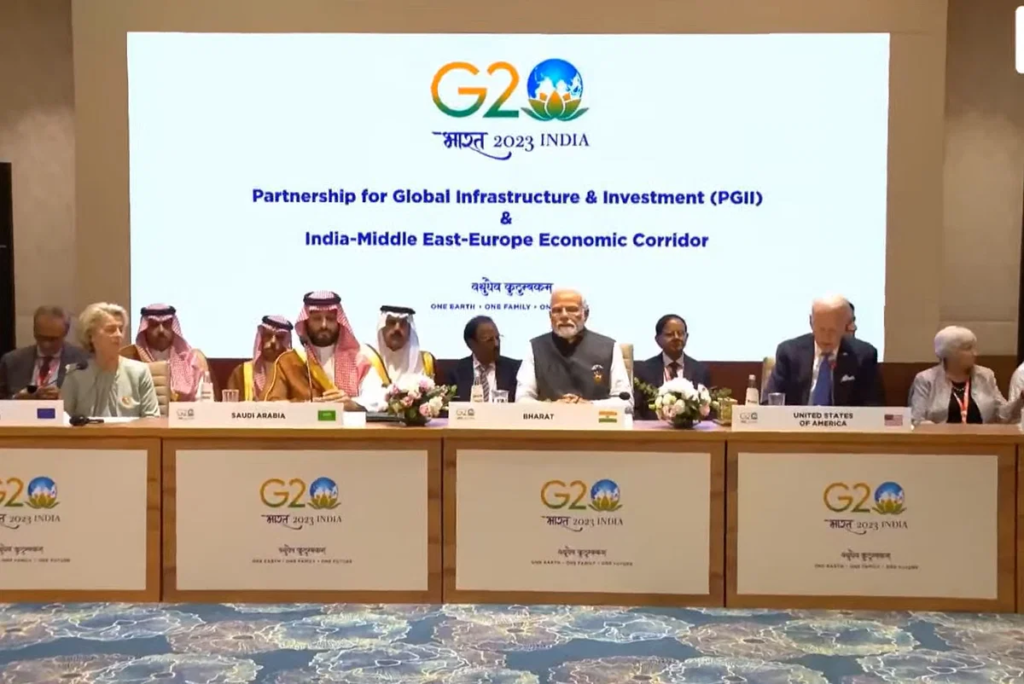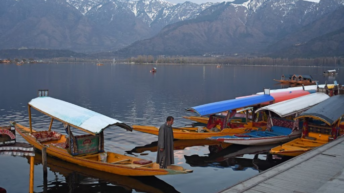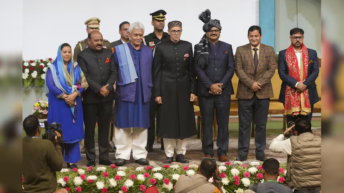|
Listen to article
Getting your Trinity Audio player ready...
|

Only the churlish can deny the unqualified success of India’s stewardship of the G20 Summit (September 8-10, 2023), from its evolution to G21 with the grant of full membership to the African Union at New Delhi’s suggestion; to the adoption of the G20 declaration by consensus early on September 9, without any last minute glitches; the announcement of a Global Biofuel Alliance; and above all, the launch of a new India-Middle East-Europe Corridor to enhance trade and economic integration between West Asia, including Israel, and Europe.
Quite a bouquet of diplomatic coups and a feather in the cap of Prime Minister Narendra Modi, the Ministry of External Affairs, and the Sherpas involved in this gigantic feat. Although the Cassandras had predicted gloom after Russian President Vladimir Putin and Chinese President Xi Jinping recused themselves due to domestic issues, their respective delegations cooperated with the aims of the summit and helped finalise the declaration. Sherpa Amitabh Kant was jubilant, “With 83 paras and absolutely no dissent, no footnotes, no chair summaries, the #NewDelhiLeadersDeclaration symbolises unparalleled global consensus.” It is possibly the most important document on multilateral governance in recent years.
The India-Middle East-Europe Economic Corridor (IMEC) includes the United States, India, Saudi Arabia, UAE, France, Germany, Italy and the European Union, and is expected to trigger considerable regional investment. Prime Minister Modi said, “As history unfolds, may this corridor be a testament to human endeavour and unity across continents.” The corridor will establish seamless trade routes and ports connecting India, Saudi Arabia, the United Arab Emirates, Jordan, Israel, and the European Union and parallel the INSTC with Iran and Russia, reinventing the old land and maritime routes of the early centuries BC.
Saudi Crown Prince Mohammed bin Salman, who has been single-mindedly focused on transforming his nation by diversifying its oil economy, unveiled the signing of the memorandum of understanding to establish the corridor. Indeed, the leaders of Saudi Arabia, UAE, and Qatar are keen to connect with India and the European markets. US President Joe Biden thanked UAE President Mohamed Bin Zayed for raising the idea of the project with the US administration six months ago.
The India-Middle East-Europe Economic Corridor will comprise two separate corridors (i) East corridor connecting India to the Arabian Gulf and (ii) Northern corridor connecting the Arabian Gulf to Europe. It will include a rail line that, upon completion, will provide a reliable and cost effective cross-border ship-to-rail transit network to supplement existing multi-modal transport routes for transit of goods and services between South East Asia through India to West Asia / Middle East and Europe. Greece has a central role in the Corridor. The participating nations are keen that the Corridor does not burden any nation with unsustainable debt, while maintaining ecological and environmental standards.
The Corridor places India on the route of trade flows from South East Asia to the Gulf, West Asia and Europe, with opportunities in the logistics and transportation sector. Once ready, it will strengthen supply chains, generate jobs and improve trade facilitation and accessibility. It will boost clean energy and hydrogen production and energy transmission infrastructure, besides enhancing infrastructure in the logistics and transportation sector.
Known as the Partnership for Global Infrastructure Investment, the project could potentially boost trade between India and Europe by up to 40 percent. It could help to normalise relations between Israel and the Gulf states, a major goal of the Biden administration. US President Joe Biden called it a “game-changing investment,” and the European Commission’s Ursula von der Leyen noted that the initiative is “a green and digital bridge across continents and civilisations.”
President Biden’s principal deputy national security adviser, Jon Finer, outlined three reasons for developing the corridor: (i) to increase prosperity among the countries involved through increased flow of energy and digital communications, (ii) help deal with the lack of infrastructure needed for growth in lower- and middle-income nations, and (iii) help reduce the “turbulence and insecurity” in the Middle East.
US national security adviser Jake Sullivan said the enhanced infrastructure would establish the Middle East as a hub for economic activity instead of as a “source of challenge, conflict or crisis” as it has been in recent history. The White House began discussions with regional partners in January, and Sullivan, and senior White House aides Amos Hochstein and Brett McGurk visited Saudi Arabia in May to meet with their Indian, Saudi and UAE counterparts. Though Riyadh does not yet have diplomatic ties with Tel Aviv, Israel and Jordan were included in the project.
Former Indian Prime Minister Manmohan Singh commended India’s stand on Russia-Ukraine war, saying India has done “the right thing in putting our sovereign and economic interests first while also appealing for peace. The G20 was never envisaged as the forum for settling security-related conflicts. It is important for the G20 to set aside security differences and keep its focus on policy coordination to tackle the challenges of climate, inequality and confidence in global trade”.
Dr. Manmohan Singh said, “I am very glad that India’s rotational chance for the Presidency of the G20 came during my lifetime and I am witness to India hosting world leaders for the G20 summit. Foreign policy has always been an important element of India’s governance framework, but it is fair to say that it has become even more relevant and important to domestic politics today than earlier. While India’s standing in the world should rightfully be an issue in domestic politics, it is equally important to exercise restraint in using diplomacy and foreign policy for party or personal politics.”
At the G20, the United States and Europe also announced new investments in a rail line linking Angola with the Democratic Republic of Congo and Zambia. President Biden said, “This is a game-changing regional investment. And both of these are huge, huge steps forward, but they’re far from the only ones. We’re continuing to make big investments in infrastructure around the world.”
Global Biofuel Alliance
PM Modi, along with the leaders of Singapore, Bangladesh, Italy, USA, Brazil, Argentina, Mauritius and the UAE, launched the Global Biofuel Alliance (GBA) on September 9, 2023, on the sidelines of the G20 Summit in New Delhi.
The Global Biofuel Alliance is an initiative by India as the G20 Chair. It proposes to expedite the global acceptance of biofuels through facilitating technology advancements, intensifying utilization of sustainable biofuels, shaping robust standard setting and certification through inputs from a wide spectrum of stakeholders. The alliance will act as a central repository of knowledge and an expert hub.
Union Minister for Information & Broadcasting and Youth Affairs & Sports, Anurag Thakur, said GBA is a milestone in the world’s quest for cleaner and more sustainable alternative energy sources. As climate and earth protection are the need of the hour, the world must shift gradually to sustainable bioenergy having zero emissions, to reduce carbon footprint and promote the bio-economy. India has successfully experimented with fuel blending and solar energy; the National Green Hydrogen Mission is a step towards clean energy.
To help the countries of the Global South, India proposed to launch a G20 Satellite Mission for Environment and Climate Observation.
References
1] India-Middle East-Europe Economic Corridor Sealed at G20 Summit: Why it Matters, The Quint, September 10, 2023.
2] G20 Summit: ‘India-Middle East-Europe’ economic corridor, a modern-day spice route, announced, Livemint, 09 Sep 2023.
3] Manmohan Singh lauds PM Modi’s leadership, says ‘India did the right thing…’, Mint, September 08, 2023.
4] At the G20, Biden joins forces with India and the Middle East, sidelining China, NPR, September 9, 2023.
https://www.npr.org/2023/09/09/1198644841/biden-g20-india-saudi-arabia-corridor
5] Launch of the Global Biofuel Alliance (GBA), PIB, September 09, 2023.






Add comment